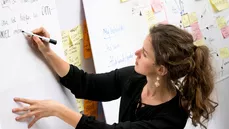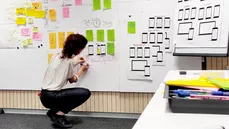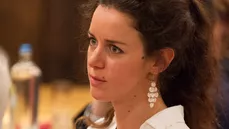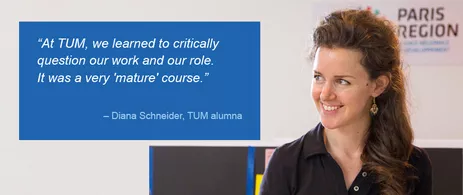In 2009, Diana Schneider started her Master’s degree in Industrial Design at TUM, where she gained her first experience with starting up a business through courses at the Center for Digital Technology and Management (CDTM). After returning to her home country Belgium in 2013, she founded Brisk Business Design – a company that supports other enterprises in applying design methodology (Design Thinking) in the definition of new products and services. TUM Brussels liaison officer Maria-Valerie Schegk met the alumna for an interview.
Why did you choose TUM for your Master’s degree?
Since I already did my Bachelor's degree in product development, I wanted to follow up with a matching Master's degree. I then compared different universities and their study programs in Europe and most of these study programs were either very focused on engineering or on the design aspect. In the end, I decided on TUM because it combines both very well, mechanical engineering and design. In addition, a third element was addressed: What is the role of the designer in the world and how can design shape behaviour, interactions, sustainability, mobility, privacy, etc. of the future?

What did you particularly enjoy about your studies in Munich?
I found the holistic approach of the degree program a real added value. At TUM you were taught to apply the design methodology to many different areas. What I also really enjoyed about studying at TUM that it was a program at eye level. With a lot of collaborative formats and little frontal teaching. In addition, the range of additional course formats, such as summer schools, was very large and we were able to fall back on a great network of mentors.
Were there any experiences or encounters at TUM that shaped your life and career path? If yes, which?
During our studies we learned to critically question our work and our role. It was a very 'mature' course. There was also a wide range of entrepreneurial courses, e.g. at the CDTM. There, we encountered topics such as how can I start a company at an early stage? How can I develop digital innovations? In addition, the work there was very interdisciplinary, which was of great added value for me.
Have you always wanted to start your own company? How did that happen?
No, not at all. I used to think that if you want to found a company, you need at least five co-founders and a lot of venture capital. It was only during my studies at TUM, talking to the mentors and my fellow students, that I discovered that the hurdle of founding a company was actually not that high. The taboo on possible failure has also been removed. That is how the idea developed to found my own company.
What was the biggest challenge you had to master when setting up your company?

The hardest part was finding the balance between the initial long-term vision that you have and the current market reality. At the beginning, you must create a need for your idea. Design Thinking was still very young back then.
You have to constantly readjust between what you want to achieve in the long term and what is needed on the market.
Who supported you when you set up your company?
On the one hand, there were guest lecturers from industry whom I got to know during my studies. In addition, my fellow students were an important support. Several of my student colleagues have also founded their own company. We’ve made similar experiences during that period, faced similar problems and could exchange on it.
What are the three main ingredients for your company's recipe for success?
First, you need one or two pilot customers, which you can then expand into a larger international network. In addition, you shouldn't dwell too long on the theory of your company formation, but rather quickly try things out on the market, even if your own service is not yet one hundred percent mature. Then you need to learn how to grow with the customers and to adapt flexibly to various needs.
What is your advice to the current generation of students / future founders?
Network maintenance is extremely important. At the beginning, you have to get to know customers, project partners and mentors. I always thought I was way too introverted to be able to do this. But then, you just have to start with smaller networking events, competitions, themed evenings. At TUM, there was an events series on women in mechanical engineering professions, which was a great start. Another piece of advice would be to continuously question yourself and your work critically and, if necessary, readjust to create something systemically relevant and sustainable. That means constantly piloting, iterating, and pivoting your own service in a user-centered manner – just like with Design Thinking!

What are your plans for a hopefully post-Covid-19 year 2022?
To carry on as it was before the crisis, but also to adjust to the new conditions that have arisen due to the pandemic. Large corporations used to think that home office was impossible, but that has changed. And that's why I'll also think about what a healthy balance between physical and virtual formats can look like in the future. This also corresponds with the need of more sustainability.
Thank you very much for the interview!
